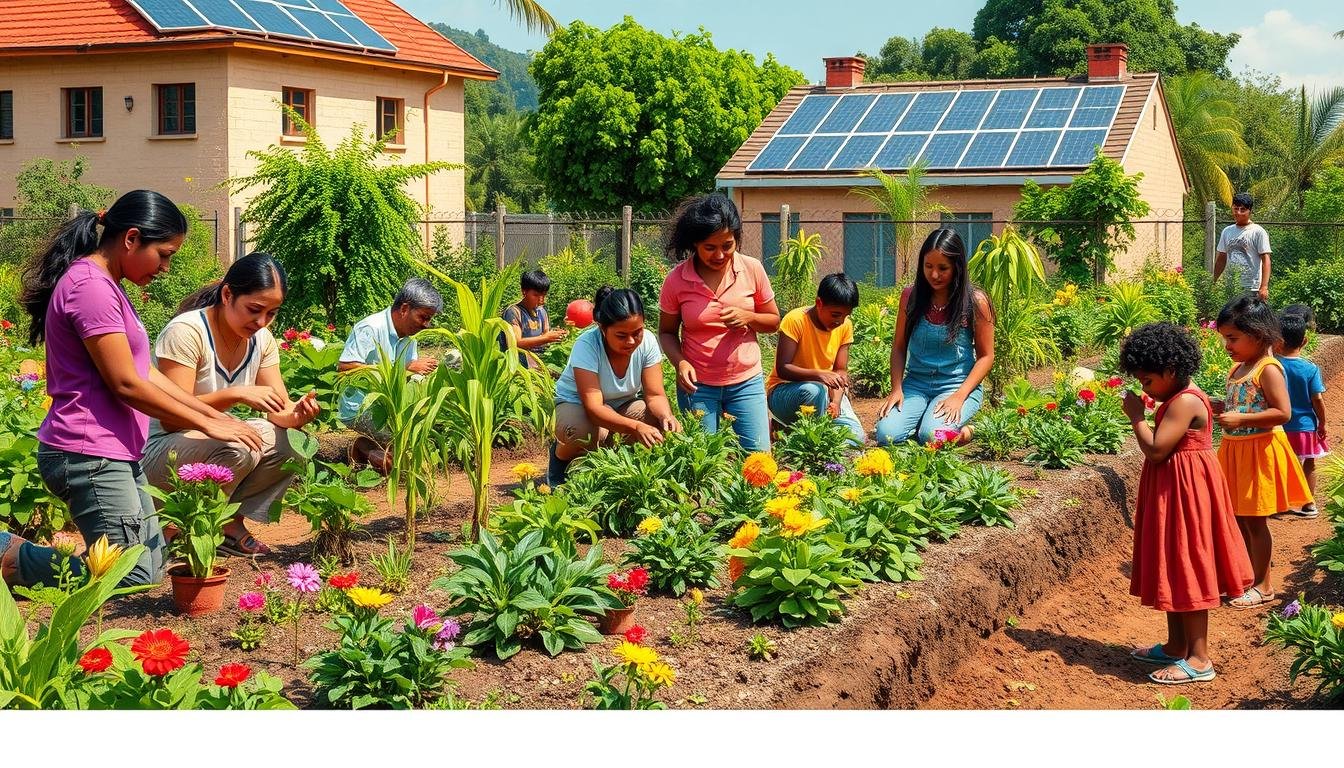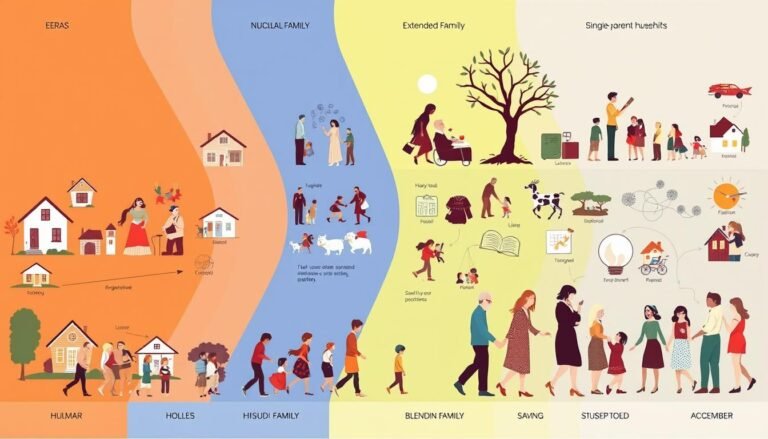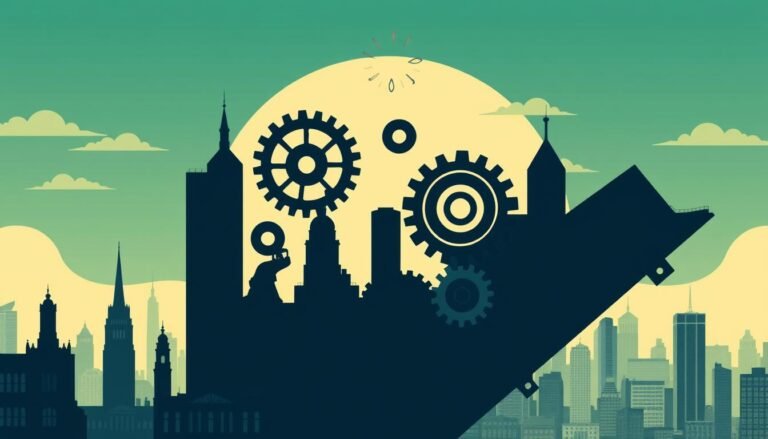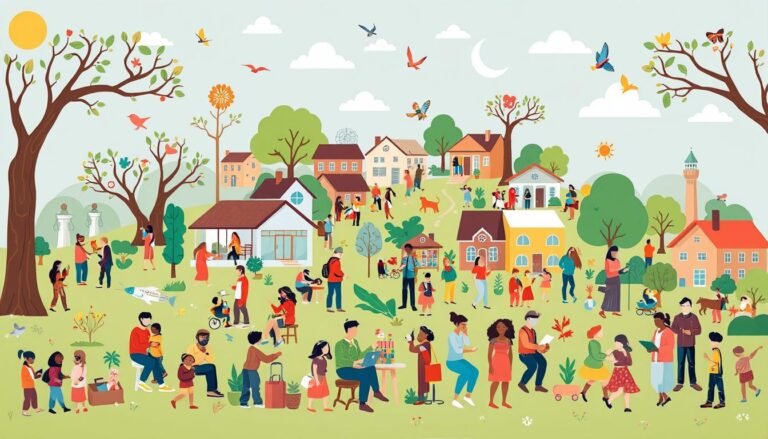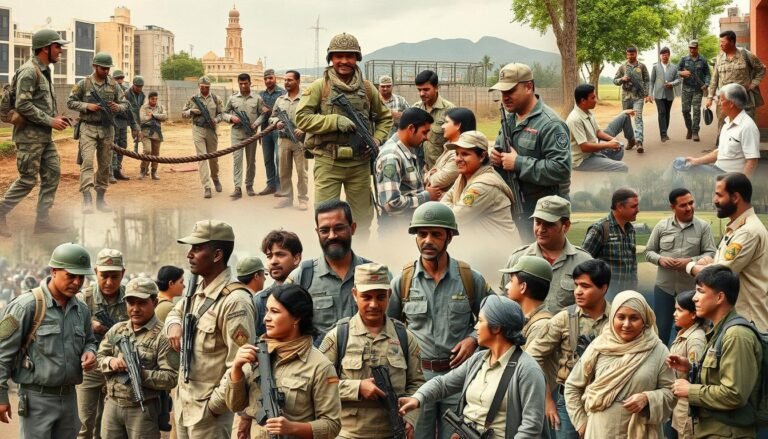The Role of NGOs in Social Change
In today’s world, non-governmental organizations (NGOs) are key players in social change. They work hard to tackle big issues like poverty, education, healthcare, and saving the environment. But do they really make a difference?
NGOs are vital for social growth and helping communities. They act on their own, finding and fixing social problems. By starting grassroots movements and community projects, they’ve made big improvements in people’s lives worldwide.
These groups get support from many places, like the public, private sectors, grants, donations, and volunteers. Working with companies, governments, and other groups, NGOs can do more and reach more people. They also push for policy changes to bring about real social change.
Key Takeaways
- NGOs tackle issues like poverty, education, healthcare, and saving the environment.
- They work on their own and aim to help, not make money.
- They get support through funding, grants, donations, and volunteers.
- They push for social change and shape policy at different levels.
- NGOs help improve healthcare in hard-to-reach places.
- They work to make things better for women and support gender equality.
- NGOs are key in protecting the environment and promoting sustainable living.
Understanding Non-Governmental Organizations (NGOs)
Non-governmental organizations (NGOs) are key to civil society. They work hard to solve social problems and bring about positive change. Let’s look at what NGOs do and how they help our world.
Definition and Characteristics of NGOs
NGOs are groups that don’t take orders from the government. They tackle issues like human rights and saving the environment. These organizations can be small or huge, affecting people all over the world.
Historical Context and Emergence of NGOs
In 1945, NGOs got their official name with the United Nations Charter. Since then, they’ve grown a lot. Now, the U.S. alone has over 1.5 million NGOs, adding 5.6% to the GDP.
Differences between NGOs and Nonprofit Organizations
NGOs and nonprofits are similar but different. NGOs work on a worldwide scale, dealing with global issues. Nonprofits usually focus on issues in one country or area. Both aim to help society, but NGOs cover a wider range of topics.
| Aspect | NGOs | Nonprofit Organizations |
|---|---|---|
| Scope | Global | Local or National |
| Focus | International Issues | Local or National Concerns |
| Scale | Often Larger | Usually Smaller |
NGOs are vital in making public policy, giving aid, and pushing for social change. Their work is key to civil society. They help tackle big global problems.
The Role of NGOs in Social Change
NGOs are key in pushing for social change and empowering communities. They tackle big issues like poverty, education, healthcare, and saving the environment. Through research and assessments, they pinpoint social problems and craft programs to fix them.
NGOs have grown a lot in recent times. Even in places like China, where the government controls a lot, more NGOs have started. Now, they’re not just activists but also key providers of services.
NGOs help fill the gap between communities and the resources they need. They open schools, give out clean water, and set up clinics in places that lack these things. This way, they make sure help gets to those who really need it.
“NGOs are the backbone of social change, working tirelessly to empower communities and create lasting impact.”
NGOs are great at getting resources together. They use money from the public and private sectors, grants, donations, and volunteers to keep their projects going. This mix of funding lets them keep up their work over time and adapt to new needs.
| NGO Focus Area | Impact |
|---|---|
| Poverty Alleviation | Improved livelihoods and economic stability |
| Education | Increased literacy rates and skill development |
| Healthcare | Better access to medical services and health awareness |
| Environmental Conservation | Promotion of sustainable practices and climate action |
NGOs have to deal with challenges like high costs and changing priorities. To keep going, they often change their ways, focusing on areas that bring in money. This flexibility is key for their survival in a world that’s always changing.
Advocacy and Policy Influence
NGOs are key in shaping public views and pushing for policy changes. They use their knowledge to affect decisions at all levels. Their main goal is to support social justice, equality, and human rights.
Shaping Public Opinion
NGOs work hard to make people aware of big issues. They hold workshops, seminars, and run campaigns to teach about social problems. By fighting stereotypes and building empathy, they aim to make society more caring and informed.
Lobbying for Legislative Changes
NGOs are big on policy influence. They talk to policymakers, help make policies, and push for laws that help those in need. They use solid evidence to show the importance of issues and fight for social justice.
International Forums and Conferences
NGOs join global talks, offering advice to governments, agencies, and the UN. Being part of these events lets them share the views of local communities. This ensures that the voices of the less heard are heard worldwide.
“NGOs are the voice of the voiceless, bringing attention to issues that might otherwise be overlooked in policy discussions.”
| NGO Activity | Impact |
|---|---|
| Public Awareness Campaigns | Increased understanding of social issues |
| Policy Advocacy | Improved legislation for vulnerable groups |
| International Participation | Local perspectives in global discussions |
Thanks to their hard work, NGOs keep being strong forces for change. They shape policies and public views to make the world more fair and just.
Grassroots Mobilization and Community Empowerment
NGOs are key in getting people involved and making communities stronger. They work from the bottom up to bring about positive change. Their work has led to more people helping out and getting involved.
Since the early 2000s, grassroots groups have popped up all over the world. They step in when governments don’t listen and push for people to get involved. In Guatemala, for instance, these groups keep an eye on health services for rural indigenous folks.
NGOs help build the skills of individuals and communities. This means more people find jobs and make more money. They also start projects that help both people and the planet.
“Grassroots mobilization is the cornerstone of community development. It empowers individuals to advocate for their rights and create lasting change.”
Grassroots efforts make a big difference in many areas:
- Health: In India, people check up on healthcare services, making them better.
- Education: NGOs help get more kids in school by making education available.
- Human Rights: In Peru, local groups work with NGOs to fix healthcare issues.
| Initiative | Impact |
|---|---|
| Capacity Building Programs | Improved self-sufficiency levels |
| Social Entrepreneurship Ventures | Increased job creation and income generation |
| Grassroots Mobilization Campaigns | Enhanced public support for social causes |
NGOs keep working to make communities better, empower locals, and get people involved. They help create a society that’s fair and welcoming for everyone.
Humanitarian Assistance and Crisis Response
NGOs are key in helping out during disasters and crises around the world. They move fast and can change plans quickly, making them crucial in tough times. Whether it’s natural disasters or conflicts, NGOs are often the first ones there, offering vital help to those who need it.
Disaster Relief Efforts
When disasters happen, NGOs jump right in. They give out food, water, and medical supplies to those hit hard. They also create temporary shelters and offer mental support to those who have lost a lot.
Essential Services in Conflict Zones
In places hit by conflict, NGOs are a beacon of hope. They bring medical care, food, and clean water to those who’ve lost these basics. They also protect those who are most at risk and speak up for their rights.
Long-term Reconstruction
NGOs don’t just help right after a disaster. They stick around to rebuild communities for the long haul. This includes fixing buildings, helping people get back to work, and supporting schools. By focusing on lasting solutions, NGOs help communities recover and get stronger.
| NGO Activity | Impact |
|---|---|
| Emergency assistance | Immediate relief to disaster-affected populations |
| Medical aid | Saving lives and preventing disease outbreaks |
| Food and water distribution | Preventing hunger and dehydration |
| Shelter support | Providing safe housing for displaced people |
Even with problems like not having enough money and safety issues, NGOs keep leading the way in helping out. They use technology and work with local groups to make a big difference. With more disasters happening due to climate change, NGOs’ role in helping is more important than ever.
Sustainable Development and Environmental Conservation
NGOs are key in pushing for sustainable development and protecting the environment. They work towards the UN’s Sustainable Development Goals. This includes tackling big issues like climate change and inequality. Their goal is to protect the environment, act on climate change, and promote sustainable ways of living.
NGOs have greatly helped with reforestation efforts around the world. In the last ten years, they’ve planted over 7 billion trees. This covers about 5 million hectares of land. It has brought back 350,000 square kilometers of forest, helping over 300 animal and plant species.
In Tanzania, NGOs worked with local communities to bring back over 100,000 hectares of lost forest. This work made farming better and gave local farmers more water. It shows how working together can make a big difference for the environment.
NGOs also help with sustainable economic growth. They support entrepreneurs, help local businesses, and offer job training. By promoting things like recycling and using renewable energy, they help make the environment sustainable for the long term.
| NGO Impact Area | Achievement |
|---|---|
| Tree Planting | 7 billion trees planted globally |
| Land Restoration | 350,000 sq km of forest land restored |
| Biodiversity | 300+ species benefited |
| Public Awareness | 60% increase in support for tree planting |
NGOs keep working hard to promote sustainable living and protect the environment. They’re making a big difference for our planet’s future.
Education and Capacity Building
NGOs are key in boosting education and building capacity globally. They aim to make lasting changes by giving people knowledge and skills.
Promoting Literacy and Access to Education
Many NGOs work hard to increase literacy and offer education chances. They set up schools in places that need them most, give out books, and train teachers. This helps cut down on illiteracy and gives people the skills they need to join society.
Vocational Training and Skill Development
NGOs also provide vocational training to make people more employable and self-sufficient. These programs teach a variety of skills, like technical trades and starting a business. By focusing on skills, NGOs help people get better jobs and improve their financial lives.
Empowering Local Organizations and Leaders
Building capacity also means strengthening local groups and growing community leaders. NGOs hold workshops and training to improve leadership, manage projects, and make organizations more efficient. This way, the work of NGOs can keep going even after they’re gone.
| Capacity Building Area | Impact |
|---|---|
| Literacy Programs | Reduced illiteracy rates |
| Vocational Training | Improved employability |
| Leadership Development | Empowered local communities |
Through these efforts, NGOs start a chain of positive change. By investing in education and building capacity, they set the stage for lasting social and economic growth in communities worldwide.
Human Rights Protection and Advocacy
NGOs are key in fighting for human rights, social justice, and equality. They protect individual freedoms and push for global human rights standards. They help victims and work for law changes.
NGO defenders use laws like the Universal Declaration of Human Rights to protect freedoms worldwide. They work on a global scale, helping make human rights laws.
“NGOs have been instrumental in addressing various human rights issues, such as the rights of detainees and prisoners, child rights, and the rights of indigenous peoples.”
NGOs have a big impact. For example, Amnesty International’s 1972 campaign against torture led to big changes. They also helped pass the UN Convention on the Rights of the Child in 1989.
| NGO | Focus Area | Notable Achievement |
|---|---|---|
| Amnesty International | Civil and Political Rights | Released briefing on human rights abuses in 60 countries during COVID-19 |
| Human Rights Watch | Global Human Rights | Conducts research and advocacy in over 90 countries |
| Save the Children | Child Rights | Operates in 120 countries, reaching millions of children |
Even with challenges, human rights NGOs keep shaping public opinion and fighting for justice. They spread information, do research, and advocate for equality. Their work is key to tackling global issues and promoting fairness.
Challenges Faced by NGOs in Driving Social Change
NGOs are key to making society better, but they face big challenges. These groups struggle with issues that can slow them down or stop them from making a difference.
Funding Constraints and Sustainability Issues
Getting steady funding is a big problem for NGOs. They often get money from donations, grants, and fundraising. This makes planning for the future hard and can put their work at risk.
Political Pressure and Regulatory Obstacles
NGOs often deal with political pressure, especially in places where the government limits what they can do. Governments might make rules that make it hard for NGOs to work. These can include hard registration processes or limits on money from outside the country.
Maintaining Neutrality and Credibility
NGOs have to stay neutral and keep people’s trust. They work with different groups, like governments and businesses, without giving up their goals or values. This is key to keeping their work effective.
“NGOs confront numerous challenges in the ever-changing environment of public administration, but they also have opportunities to maximize their impact.”
Even with these challenges, NGOs are vital in helping governments, especially in places where public services are lacking. The COVID-19 pandemic showed how important NGOs are in helping during crises and supporting communities. This made many organizations find new ways to keep helping despite the tough times.
Conclusion
NGOs are key players in pushing for social change and global improvement. In the U.S., there are about 1.5 million NGOs, and in India, there are 2 million. They work on many issues, like human rights and saving the environment, both locally and globally.
The impact of NGOs on social change is clear. During the COVID-19 pandemic, 19 NGOs in Zambia and South Africa quickly changed their programs. They made health education fit the needs of their communities. This shows how important they are in times of crisis and in helping communities.
It’s hard to measure how effective NGOs are, but they have a big influence on big organizations. They help set agendas, watch over international groups, and push for environmental causes. Even with funding issues and rules to follow, NGOs keep connecting communities with governments. They help make social progress and support global development.
Source Links
- THE ROLE OF NGO’S IN SOCIAL DEVELOPMENT
- Role of NGOs in the Modern Society | Chezuba
- The Impact of NGOs on Society: Challenges and Opportunities.
- What is an NGO? What role does it play in civil society?
- Human Rights Activism and the Role of NGOs – Manual for Human Rights Education with Young people – www.coe.int
- What Are NGOs? Understanding Their Purpose in Public Policy – Plural Policy
- The changing relationship between governments and NGOs | LSE Research
- The Importance of Advocacy in Social Work
- Non-Governmental Organizations (NGOs) in the United States – United States Department of State
- What is an NGO: Definition, Role, Duties, Types I liberties.eu
- Accelerating Action on Sustainable Development Goals: Grassroots organisations and the sustainable development goals: no one left behind?
- What is the role of NGO in social action?
- Grassroots organizations are just as important as seed money for innovation – UNHCR Innovation
- NGOs and Humanitarian Assistance
- The Crucial Role of NGOs in Disaster Relief and Humanitarian Aid
- What is the Role of NGO in Sustainable Development?
- The Role of NGOs in Promoting Sustainable Development Through Tree Planting – One More Tree Foundation
- The Rise and Role of NGOs in Sustainable Development
- Role of an NGO in social development.
- Microsoft Word – 9 NGO Tips – Capacity Building Key Concepts_9.30.11_kg
- Role of an NGO in social development
- The Role of Human Rights NGOs
- What Role Do NGOs Play in Protecting Human Rights?
- Role Of Human Rights NGOs In International Human Rights Protection
- The Changing Roles of Non-Governmental Organizations in Development in South Africa: Challenges and Opportunities
- Non-governmental organization
- The Role of NGOs in COVID-19 Community-Based Education
- The Impact of NGOs on International Organizations: Complexities and Considerations

